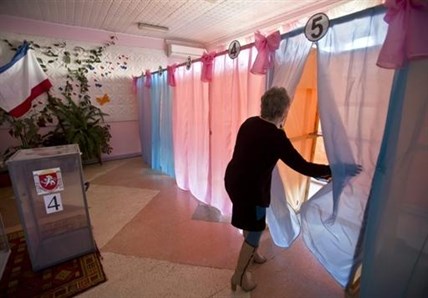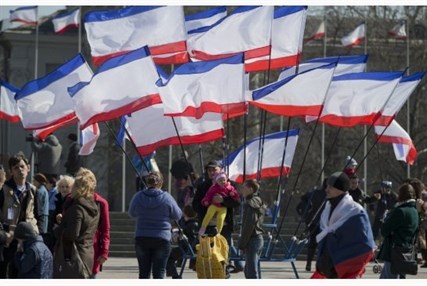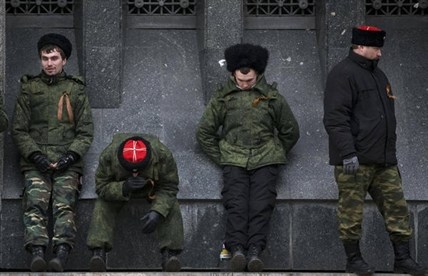
Svetlana Kalisetskaya, chairman of polling committee, checks a voting cabin after completing preparations for Sunday's referendum at a polling station in Perevalne, Ukraine, Saturday, March 15, 2014. Tensions are high in the Black Sea peninsula of Crimea, where a referendum is to be held Sunday on whether to split off from Ukraine and seek annexation by Russia.
Image Credit: AP Photo/Vadim Ghirda
March 16, 2014 - 11:31 AM
VOTE ON WHETHER TO SCEDE FROM UKRAINE
SIMFEROPOL, Ukraine - In a referendum watched closely around the world, residents in Ukraine's strategic Crimean Peninsula voted Sunday on whether to demand greater autonomy or split off and seek to join Russia. The vote has been condemned as illegal by the United States and European countries.
The referendum comes two weeks after Russian-led forces seized control of Crimea, a predominantly ethnic Russian region on the Black Sea that hosts a key Russian naval base. Its residents say they fear the new Ukrainian government that took over when President Viktor Yanukovych fled to Russia last month will oppress them.
Ukraine's new prime minister insisted again Sunday that neither Ukraine nor the West will recognize the referendum, which it says is being conducted at gunpoint.
"Now, on the territory of the autonomous republic of Crimea under the stage direction of the Russian Federation, a circus performance is underway: the so-called referendum," Prime Minister Arseniy Yatsenyuk told a government meeting. "Also taking part in the performance are 21,000 Russian troops, who with their guns are trying to prove the legality of the referendum."
Russia raised the stakes Saturday when its forces, backed by helicopter gunships and armoured vehicles, took control of a Ukrainian village and a key natural gas distribution plant outside of Crimea — the first Russian military move into Ukraine beyond the peninsula of 2 million people. The Russian forces later returned the village but kept control of the gas plant, according to Ukraine's border guard agency.
If Sunday's referendum passes, Russia faces the prospect of quick sanctions from Western nations.
But so far Russian President Vladimir Putin has vigorously resisted calls to pull back in Crimea. At the United Nations on Saturday, Russia vetoed a Security Council resolution declaring the referendum illegal. China, its ally, abstained and 13 of the 15 other nations on the council voted in favour — a signal of Moscow's isolation on the issue.
German Chancellor Angela Merkel spoke to Putin by phone Sunday, proposing that an international observer mission in Ukraine be expanded quickly as tensions rise in the country's east. Her spokesman said she also condemned the Russian seizure of the gas plant.
In Sevastopol, Crimea's key port and the site of the Russian naval base, more than 70 people surged into a polling station Sunday within the first 15 minutes of voting.
"Today is a holiday!" said 66-year-old Vera Sverkunova, breaking into a patriotic war song: "I want to go home to Russia. It's been so long since I've seen my mama."
"Today is an important day for all Crimea, Ukraine and Russia," said voter Manita Meshchina.
Speakers blared the city anthem up and down the streets, giving Sevastopol a block-party feeling. But the military threat was not far away — a Russian naval warship still blocked the port's outlet to the Black Sea, trapping Ukrainian boats. Russia pays Ukraine $98 million a year in rent for the naval base at Sevastopol.

Pro-Russian Crimeans attend a rally in Lenin Square in Simferopol on Saturday, March 15, 2014 a day ahead of the crucial referendum on the region's future.
Image Credit: AP Photo/Adim Ghirda
At a polling station inside a historic school in Sevastopol, Vladimir Lozovoy, a 75-year-old retired Soviet naval officer, began tearing up as he talked about his vote.
"I want to cry. I have finally returned to my motherland. It is an incredible feeling. This is the thing I have been waiting for for 23 years," he said.
But Crimea's large Muslim Tatar minority — many of whom were forcibly removed from their homeland and sent to Siberia and elsewhere during Soviet times — remained defiant.
The Crimea referendum "is a clown show, a circus," Tatar activist Refat Chubarov said on Crimea's Tatar television station Sunday. "This is a tragedy, an illegitimate government with armed forces from another country."
The fate of Ukrainian soldiers trapped in their Crimean bases by pro-Russian forces was still uncertain. Crimea's pro-Russian authorities have said if those soldiers don't surrender after Sunday's vote, they will be considered "illegal."
"This is our land and we're not going anywhere from this land," Ukraine's acting defence minister, Igor Tenyuk, said Sunday in an interview published by the Interfax news agency.
But Tenyuk later said an agreement had been reached with Russia that its forces would not block Ukrainian soldiers in Crimea through Friday. It was not clear exactly what that meant.

Cossacks guard the regional parliament building during the Crimean referendum in Simferopol, Ukraine, Sunday, March 16, 2014.
Image Credit: AP Photo/Adim Ghirda
In the regional capital of Simferopol, blue-and-yellow Ukrainian flags were nowhere to seen but red, white and blue Russian and Crimean flags fluttered in abundance in the streets.
Ethnic Ukrainians interviewed outside the Ukrainian Orthodox cathedral of Vladimir and Olga said they refused to take part in the referendum, calling it an illegal charade stage-managed by Moscow. Some said they were scared of the potential for ethnic cleansing in the coming weeks, similar to what happened in parts nearby Georgia, another former Soviet republic, after a brief war with Russia in 2008.
"We're just not going to play these separatist games," said Yevgen Sukhodolsky, a 41-year-old prosecutor from Saki, a town outside Simferopol. "Putin is the fascist. The Russian government is fascist."
Vasyl Ovcharuk, a retired gas pipe layer who worked at Ukraine's Chornobyl nuclear disaster in 1986, predicted dark days ahead for Crimea.
"This will end up in military action, in which peaceful people will suffer. And that means everybody. Shells and bullets are blind," he said.
___
Dalton Bennett in Sevastopol, Mike Eckel in Simferopol, and Jim Heintz and Maria Danilova in Kyiv contributed to this story.
News from © The Associated Press, 2014